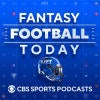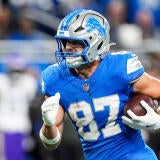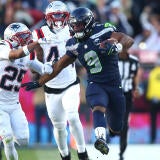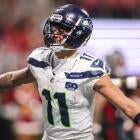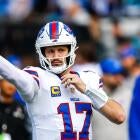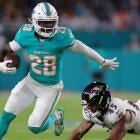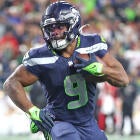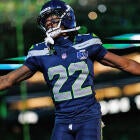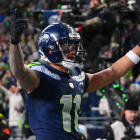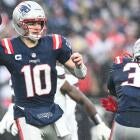2019 Fantasy Football Draft Prep: Rankings breakdown No. 30-21
Learn why you should — and maybe why you shouldn't — draft players 30-21 in our consensus rankings.
Welcome to our 2019 Player Profiles series. We are going through the top 100 in the consensus PPR rankings of Heath Cummings, Jamey Eisenberg and Dave Richard to give you the case for and the case against drafting each player. By the time you're done, you'll know everything you need to know for drafting in 2019.
Here are players 21-30, where there are some potential No. 1 running backs still available:
30. Stefon Diggs, WR, MIN
The Case For: While he hasn't been as good as Thielen, there's an argument that Diggs is actually the most talented receiver in Minnesota. He's caught at least 67 percent of his targets each of the past three years and he's scored 13 touchdowns in his past 20 games. He's coming off a career-high in catches and yards as well. Diggs is an excellent choice in the third round if you start your draft with two running backs.
The Case Against: I could just repeat the case against Thielen. Diggs will suffer from a low-volume pass attack in 2019 as well. The other problem for Diggs is that he hasn't been as efficient with his targets as Thielen. His catch rate and yards per catch were both worse in 2018, and he's more likely to draw the opposing team's best corner. Both of these receivers will be good in 2019 but it's hard to see either being great, or even as good as they were last year.
29. Todd Gurley, RB, LAR
The Case For: You could write thousands of words for or against Gurley and we probably will this offseason. But the case for is pretty simple: When he's been right he's been the most valuable player in Fantasy. Even last year he finished as the No. 1 back in non-PPR scoring despite playing just 14 games. In 2017 he outscored every other player at the position by four points per game in that format. The case for Gurley is you may just be drafting the best player in Fantasy Football after the first overall pick.
The Case Against: There's been enough smoke about his knee that it seems highly unlikely Gurley will reach the ceiling he's shown us the past two seasons. Then you have to think about the floor, and there's more than one area of concern here. He could have a chronic problem that completely derails his career; his knee could be weakened, priming him for a more serious injury in 2019; or he could be fine and the Rams could decide to limit him in the first half of the season in hopes of keeping him that way. All three of those possibilities are speculation, which is all we're left with at this stage. The fact that the Rams traded up to draft Darrell Henderson in the third round doesn't make you feel any better about this situation. The one thing we can say for certain is that if you're the type of player who doesn't want to lose his league in the first round, you're probably taking someone other than Todd Gurley.
28. Damien Williams, RB, KC
The Case For: Williams started five games for the Chiefs last season, including the playoffs. In those five starts he totaled 572 yards and scored eight touchdowns. That's obviously an absurd pace, so it shouldn't be used as an expectation, but we're also talking about arguably the best offense in the league. We're also talking about a running back in an Andy Reid offense. If you look back over Reid's career, in most years you'll find either his offense produced a top-10 running back or his starting running back got hurt. There are few exceptions. From Brian Westbrook to LeSean McCoy, Jamaal Charles and Kareem Hunt. Part of that is because running backs are heavily involved in all facets of the game, but also because Reid's offenses generally lean heavily on one back. Williams' finish to 2018 made it look like he'll be the next in a long line.
The Case Against: The Chiefs signed Carlos Hyde in the offseason, and up until December of 2018 just about everyone would have told you Hyde was a better running back than Williams. Hyde has experience as a feature back and caught 59 passes in 2017, so he can do that too. They also drafted Darwin Thompson, a smaller speed back who could supplant Williams as the passing downs back. While Reid doesn't seem to like committees, that doesn't mean Hyde or Thompson can't take the job from Williams. And it's really hard to spend a third-round pick on a running back who may still have to compete for a starting role.
27. Amari Cooper, WR, DAL
The Case For: We've always viewed Cooper as a supremely talented wide receiver who never quite gave us all we expected, which is really unfair considering he had 155 catches and more than 2,200 yards through his first two seasons. But he really put it together once he was traded to the Cowboys. In 11 games with Dallas he caught 66 passes for 896 yards and seven touchdowns. That 16-game pace would have smashed his best season in Oakland. Whether it was just a change of scenery or Cooper going to a new level at age 24, he looks primed to deliver on his promise in 2019.
The Case Against: There really has been a lot of inconsistency in Cooper's career, and you don't exactly think of the Cowboys' offense as one that's going to produce big passing numbers. Ezekiel Elliott will still be the centerpiece of this offense that will still run almost as often as it throws.
26. A.J. Green, WR, CIN
The Case For: Green is still a supremely talented No. 1 receiver on a team that figures to be trailing more often than it leads. He's averaged nine targets per game the past three seasons, and the coaching change in Cincinnati could pave the way for a more modern offensive philosophy. Green doesn't have a great quarterback, but it's the same quarterback who helped him to a top-10 Fantasy finish in his past four seasons of at least 14 games.
The Case Against: Green is also going to be 31 years old before the season starts and he's missed significant time due to injury in two of the past three years. The emergence of Tyler Boyd could mean a slightly smaller chunk of the target share, and his new head coach comes from a system in Los Angeles that is all about spreading the ball around.
25. Leonard Fournette, RB, JAC
The Case For: Despite the drama in Jacksonville, battling injuries and almost no threat of a passing game, Fournette has averaged 93 yards per game and scored 16 touchdowns in his first 21 games. He's made amends with Tom Coughlin, and the odds are Jacksonville's defense will be dominant again and put the Jaguars in more running situations. Fournette has also been very good in the passing game, catching nearly 80 percent of his targets and averaging better than 8 yards per reception. He certainly looks part of a feature back who can do it all, just like we thought he was when he was drafted fourth overall in 2017.
The Case Against: He's only played 21 games in his first two seasons, and the Jaguars just hired an offensive coordinator (John DeFelippo) who got fired because his former team thought he was calling too many pass plays. If the injuries weren't enough of a concern, the Jaguars legitimately considered cutting ties with Fournette in the offseason. The selection of Ryquell Armstead could also mean the Jaguars want to be prepared in case they do tire of Fournette. There's a very low floor here and there may not be much of a ceiling if the offensive line is as bad as it was last year.
24. George Kittle, TE, SF
The Case For: Like Ertz, Kittle is the true No. 1 on his team. Or at least he was last year, seeing 25% of his team's targets. But he was also different than Ertz in that he was far more productive with the ball in his hands. He averaged 15.6 yards per reception and finished eighth in the NFL in receiving yards. The 49ers added more at running back this offseason than they did at receiver, so Kittle should again be one of the three actual difference-makers at tight end.
The Case Against: There is a little bit of concern about just how sustainable Kittle's production was. More than 20% of his receiving yards came on four plays and he had six plays of more than 40 yards. At the very least it's highly unlikely he'll have three plays of more than 70 yards again. There's also some reason to be concerned about his target share after the team drafted Deebo Samuel and Jalen Hurd. There is a ton of young talent in this receiving corps and I would expect they'll be targeted. The regression and volume concerns aren't enough to drop him out of the top three tight ends, but it might make you think twice about his Round 3 price tag.
23. Dalvin Cook, RB, MIN
The Case For: Latavius Murray is gone, Cook will be healthy entering the season, and he's been pretty great when he's gotten enough work. Maybe most importantly, the Vikings will be more run-heavy in 2019, as they were in the last month of 2018. It also seems unlikely their offensive line will be as bad as it was in 2018. Cook has legitimate top-five upside if he holds up to a workhorse role in this new attack. He's very good in the passing game and shouldn't have his touchdowns vultured now that Murray is gone.
The Case Against: Holding up to a workhorse role is a lot to ask of a running back who has been healthy for 15 games in his first two seasons combined. Also, we're not sure his role will change that much. The Vikings drafted Alexander Mattison, who looks very much like the type of hard-nosed runner who could fill the role vacated by Murray. While the offensive line won't likely be as bad as it was in 2018, the Vikings haven't exactly done anything to make you think it will be good. There is upside with Cook in the second round, but there's significant risk as well.
22. Zach Ertz, TE, PHI
The Case For: Ertz may be listed as a tight end, but he's the No. 1 receiver for the Philadelphia Eagles. Only five receivers had more targets than Ertz in 2018, and only Michael Thomas caught more passes. While Ertz did finish a full point per game behind Travis Kelce in PPR, he would have ranked as the No. 10 wide receiver in the format. He's one of the few tight ends who should be drafted regardless of whether you have to start one. He's also a nice consolation prize in the third round if you don't draft Kelce.
The Case Against: For some guys it's really hard to find a case against, so I'm reaching a little bit here. But Ertz does have another talented tight end in Philadelphia in Dallas Goedert, and it's possible his numbers regress a little off his career year. Also, Nick Foles is gone, so if Carson Wentz suffers yet another injury, Ertz could actually see his production impacted.
21. Nick Chubb, RB, CLE
The Case For: Chubb spent the first half of his rookie year waiting for the team to get Carlos Hyde out of his way before he took off. Well, that's not entirely true. He did run for 105 yards on three carries in Week 4 against the Raiders. But once Hyde left, he became the workhorse for the Browns, with 19 or more touches in seven of their final 10 games. Chubb's big plays are what most people remember, but he also showed an ability to grind between the tackles and some ability in the passing game. With the addition of Odell Beckham, Chubb should find even more room to run. A full season of Chubb, Beckham and Baker Mayfield should make for the most exciting season in Cleveland in a long, long time.
The Case Against: Why did the Browns have to go and sign Kareem Hunt? It makes sense purely from a football sense, but it makes me a little queasy as a Fantasy player. Hunt will miss the first eight games of the season, and I can't imagine he makes an immediate impact after the suspension, but the end of the year is a little frightening at this point. If Chubb slows down or team wants to lighten his load down the stretch, this could become a headache. That would be maddening for teams that ride Chubb to the playoffs.


